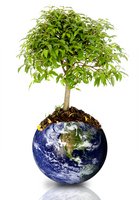

|
Welcome to Carbon News Monthly for June 30th, 2010 where we find out what others have been up to in the world of carbon-footprint-reduction. The carbon footprint of the World Cup in South Africa was expected to be 6 times the size of the last tournament held in Germany 4 years ago. In order to begin compensating, South Africa groups have been implementing some
carbon offsetting solutions, including the planting of many trees
in urban areas.
Local Green Activists there though said it just wasn't going to be enough. This group, Friends of the Earth South Africa, don't believe in carbon offsetting, and say it's just "greenwash." The travel to and from the games alone will be quite significant.
Wilfried Lemke, Special Advisor for the United Nation’s Secretary-General on Sport for Development and Peace, was quoted as saying “With the support of various UN entities, notably the UN Environment Programme (UNEP), as well as the United Nations Development Programme (UNDP), the South African government is committed to tackling environmental issues and embracing the concept of sustainable development."
Installation of solar panels on traffic lights, billboards and streetlights in 6 host cities. This should reduce over 240 tonnes of greenhouse gas emissions in a year.
The Green Passport Initiative - This is a plan encouraging tourists to make wiser environmental choices when travelling. 100,000 Green Passports were to be produced and distributed. Passports included information listing environmental projects in host cities and best advice on environmental practices while travelling were to be available.
The Green Passport Website - Shows tourists how to calculate their own carbon footprint. Provides links to green restaurants as well.
By recording various green choices a person makes and accumulating points, prizes could be won on the website.
An environmental assessment report is to be released that will let us know what worked well, and what didn't. This is seen as an opportunity to raise awareness regarding the environment, and point out the positives of the efforts taken. And hopefully, the next World Cup can be even better when it comes to green issues.
Air Canada Offers More Choices For Travellers
Air Canada, known to lead globally by being comitted to finding and implementing
more ways towards environmental protection, has collaborated with "Zerofootprint" to offer more choices to their customers who want to do something to make up for the carbon footprint of travelling.
The Voluntary Carbon Offset Program has added two more choices for customers to choose from. Landfill Gas Recovery - Ontario - Captures landfill gas from a landfill and distributes it to a nearby plant that produces recycled content paper. Tire Recycling Program - Quebec - Utilizes used car and truck tires to manufacture a variety of products that include rubber carpets, car mats, new tires and an assortment of other post-consumer goods. These two new projects provide additional options for customers who want to neutralize their carbon footprint when travelling with Air Canada, in addition to the existing Forest Restoration project in British Columbia, which is working to create a healthy forest that will continue beyond the lifespan of the current generation of trees.
The Voluntary Carbon Offset Program first launched in 2007. Since then, passengers have offset over 15,000 tonnes of CO2 emissions, which is equivalent to taking almost 4,000 cars off the road.
Until next time, Jane |




